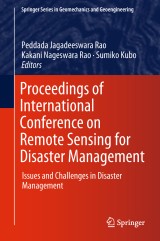Details

Proceedings of International Conference on Remote Sensing for Disaster Management
Issues and Challenges in Disaster ManagementSpringer Series in Geomechanics and Geoengineering
|
213,99 € |
|
| Verlag: | Springer |
| Format: | |
| Veröffentl.: | 23.06.2018 |
| ISBN/EAN: | 9783319772769 |
| Sprache: | englisch |
Dieses eBook enthält ein Wasserzeichen.
Beschreibungen
<p>The natural disasters are the killer agents which can/can't be predicted even though we have modern technology. Every year, in one place or another, disasters striking which is devastating the area and surroundings, leading to ecological disruption besides huge loss of life and property. India is vulnerable to cyclones, landslides/avalanches, earthquakes, floods, droughts, forest fires, epidemics, etc. The 5700-km long coast of India, with its dense population is vulnerable to cyclones/low depressions, tsunamis, etc. The 2400-km long rugged Himalayan terrain is vulnerable to landslides, avalanches and earthquakes. India is not only vulnerable to natural disasters, it is also experiencing industrial accidents. The Bhopal Gas tragedy is one of the major man-made disasters in the world. The state of Andhra Pradesh has 970-km long coastline with two major rivers, etc. The conference is conducted in Visakhapatnam, is famous for industries and tourism. Recently, several industrial accidents took place, besides major natural disasters like Hud-Hud, etc. Disaster management shall be implemented from the grass root level in vulnerable areas to improve the capacity building, so as to minimize the losses. The capacity building coupled with technology results in reduction of loss of life and property. </p>
From the content: GIS Based Management System for Flood Forecast Applications.- Rapid detection of regional level flood event using AMSR-E satellite images.- GIS Technology for Assessment of Urban Green Cover Area of Madurai Corporation in Tamil Nadu.- Insight to the potentials of Sentinel-1 SAR data for embankment breach assessment.- Security Issues in Geo-Spatial Big Data Analytics with Special Reference to Disaster Management.- Monitoring convective clouds over India and nearby regions using multi-spectral satellite observations.- Design and Fabrication of Solar Powered Unmanned Aerial Vehicle for Border Surveillance.- Quality Evaluation of CartoDEM in different Resolutions.- Multi-angle LIDAR for remote sensing smoke emissions from wildfires.- Urbanisation and Tank systems adjoining Hyderabad - A rapid assessment using Remote Sensing Techniques.<p></p><p></p><p></p>
<p>The natural disasters are the killer agents which can/can't be predicted even though we have modern technology. Every year, in one place or another, disasters striking which is devastating the area and surroundings, leading to ecological disruption besides huge loss of life and property. India is vulnerable to cyclones, landslides/avalanches, earthquakes, floods, droughts, forest fires, epidemics, etc. The 5700-km long coast of India, with its dense population is vulnerable to cyclones/low depressions, tsunamis, etc. The 2400-km long rugged Himalayan terrain is vulnerable to landslides, avalanches and earthquakes. India is not only vulnerable to natural disasters, it is also experiencing industrial accidents. The Bhopal Gas tragedy is one of the major man-made disasters in the world. The state of Andhra Pradesh has 970-km long coastline with two major rivers, etc. The conference is conducted in Visakhapatnam, is famous for industries and tourism. Recently, several industrial accidents took place, besides major natural disasters like Hud-Hud, etc. Disaster management shall be implemented from the grass root level in vulnerable areas to improve the capacity building, so as to minimize the losses. The capacity building coupled with technology results in reduction of loss of life and property. </p>
Presents state-of-the-art research on Remote Sensing for Disaster Management Results of 1st International Conference on Remote Sensing for Disaster Management 2017, held in Visakhapatnam, Andhra Pradesh, India on October 11-13, 2017 Written by leading experts in the field
Diese Produkte könnten Sie auch interessieren:

Water Quality Hazards and Dispersion of Pollutants

von: Wlodzimierz Czernuszenko, Pawel Rowinski

149,79 €















